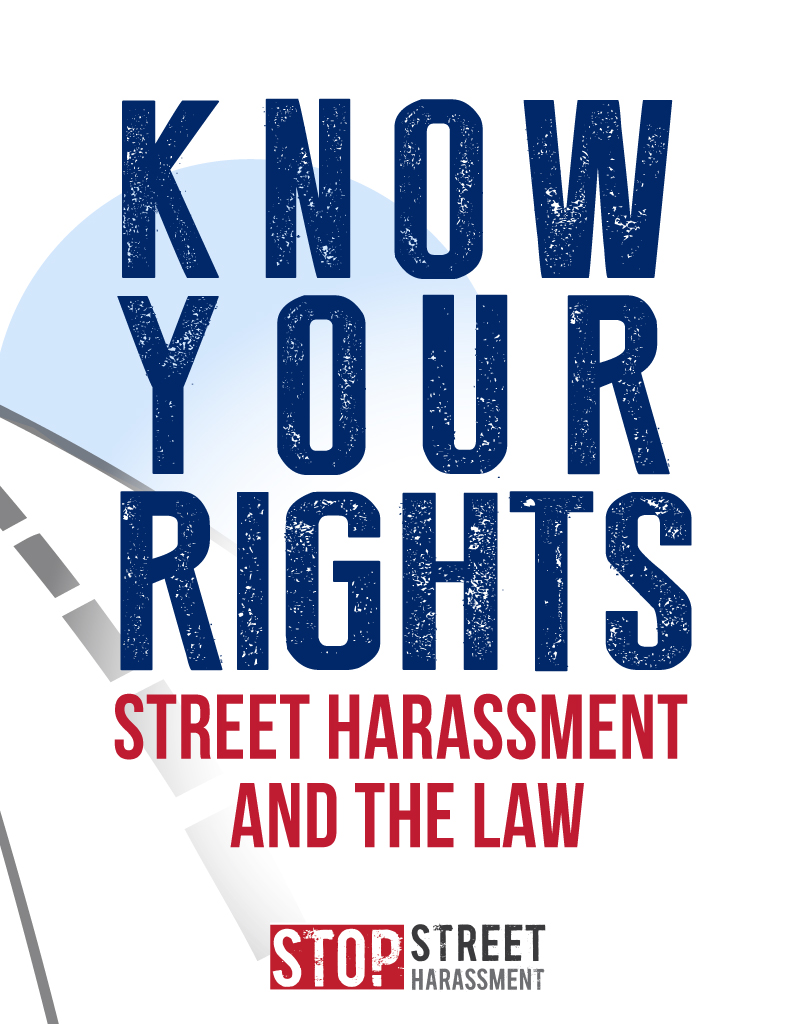 Did you know that many forms of street harassment are illegal in the United States, and you can report them to the police?
Did you know that many forms of street harassment are illegal in the United States, and you can report them to the police?
We believe there is no “best” way to deal with street harassment, since every situation and every person differs. But we want to help YOU make an informed decision about how to respond by letting you know which street harassment behaviors are illegal in your state and how you can report it, if you choose to do so.
You can find all of this information and more in the toolkit Know Your Rights: Street Harassment and the Law. It’s available as a PDF or you can explore the different sections below.
Introductory Information
State-by-State Laws
Criminal vs. Civil Remedies
This toolkit covers the criminal elements of street harassment behaviors that violate state law and therefore constitute a crime. We haven’t covered every aspect of civil responses to street harassment. You can consult a lawyer in your state to explore when, where, and why you can file a lawsuit.
Disclaimer: This Information Does Not
Constitute Legal Advice
It’s important to know when reading or using our guide that the information presented here does not constitute legal advice. Stop Street Harassment is not a law firm and the information we provide does not replace the advice of an attorney. We cannot provide guidance on a specific case, and we cannot guarantee that law enforcement or justice officials will interpret the laws as we have interpreted them.
We have collected and analyzed each state’s laws to the best of our ability, but laws do change — sometimes quickly. The outcome of a specific case will be determined by the most current state law, precedent in your state, and the details of the specific event. For advice on an individual case, contact a lawyer you trust. If you find a law in our guide that is out of date or misrepresented, please contact us.
About the Author and Collaborators
Lead Author:
Talia Hagerty is a peace economics consultant working on a variety of projects that ensure the equitable economic participation of all. She holds a B.A. in Economics from Eckerd College and an M.S. in Global Affairs with a concentration in Peacebuilding from New York University. Talia blogs about peacebuilding, human rights, economic development, and witty responses to street harassment. Follow her on Twitter: @taliahagerty.
Collaborators:
Holly Kearl is the founder of Stop Street Harassment. She’s written two books about street harassment, given 125 talks, 200 media interviews, and written 45 published articles. She began her work on this issue in 2007 when she wrote her master’s thesis on the subject at George Washington University. She also is a consultant to the United Nations and works part-time with The OpEd Project.
Whitney Ripplinger is a graduate of Brigham Young University and the University of Virginia School of Law. She works as a judicial clerk in Virginia Beach and plans to practice law in Virginia.
Rickelle Mason is a senior at the University of North Carolina at Charlotte where she is majoring in Psychology and receiving a minor in Women’s and Gender Studies. She has worked for several years in the university’s Community Psychology Research Lab, which was recently the recipient of the “Outstanding Training in Community Psychology” International Award.
Special thanks to Elizabeth Bolton and Alan Kearl for reviewing and editing sections of the toolkit and Amy M for creating the cover art and website graphics.
Thank You, Donors
This toolkit was made possible by the generous contributors to Stop Street Harassment, a 501 (c)(3) organization based in Reston, Virginia.
If you’d like to see the toolkit expand internationally, consider making a tax deductible-donation to SSH.
